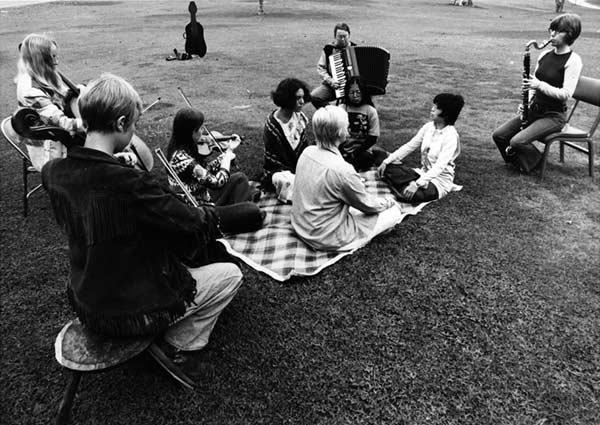Activism
By Paavali Jumppanen.
In this year’s Brave New Worlds concert series at ANAM, we explore the relationship between some of the most beloved masterpieces in our repertoire and the cultural spaces that surround them. Across the three concerts so far, we’ve witnessed how the Enlightenment informed Mozart’s music, the stylistic clashes that occurred in early 19th century Europe, and, most recently, how the dreadful demise of humanism in the wake of World War II was reflected in music. The final concert in the series delves into the entanglements of activism and music.
The popular narrative of the Western classical canon is overflowing with heroes who were often real activists. Bach was a self-taught and stubborn man who wanted to reform German church music; the divinely gifted Mozart fought to replace stories filled with nobility with sheer “soap” in opera; Beethoven scarcely missed an opportunity to demonstrate his republican beliefs, even basing his only opera (which unfolded over an inner battle lasting 15 years) on a righteous heroine fighting a tyrant; Amy Beach’s music comes to us as a demonstration of the awakening of emancipation; and John Cage’s silence is a testament to a pacifist agenda on par with Gandhi’s, regardless of whether the force to be torn down was a regime of bar lines and key signatures or simply colonial government.
All of the above is true about the actions of our beloved heroes. But human history, and music as one of its most enchanting chapters, is not a coherent great story in which one genius always passes the torch to the next. Despite their roles, it wasn’t simply due to those brilliant people that the high Baroque transitioned into the Galant Style, which then cultivated Viennese Classicism, which then (mostly due to Beethoven and Schubert) dissolved into Romanticism, Expressionism, and Neo-Classicism… we all know this creed of music history. We love to experience the past through the art we cherish, and it may also be helpful for studying purposes to identify the various stylistic milieus of the past. But to be sure, reality has always been infinitely more complex, fuzzy, and vague than a simplified timeline suggests. Between the noticeable trends, there were many more countertrends, sometimes successful and often forgotten, but always beautiful paths filled with fruits of creation. The agents of art’s perpetuum mobile, the spinners of the never-resting kaleidoscope of stylistic evolution, were infinitely more manifold than the single geniuses we tend to credit.
Rather than focusing on activists, we should focus on activism itself. Identifying Hildegard of Bingen as a role model, an educated woman and a skilful composer, makes a lot of sense. Another great matriarch, and one featured in ANAM’s upcoming Brave New Worlds concert, Pauline Oliveros, embedded her ideas of a society she dreamed of into the fabric of her music. Her works bring down the wall between performers and audience, serving as prototypes of a well-functioning democracy. Both women deserve credit for their actions, but what about the people who helped them reach positions where they became so influential? What about the writers of the books they read? And what about the crowd who yearned for their message and amplified it greatly? What about the air they breathed?
 Pauline Oliveros and the ♀ Ensemble performing “Teach Yourself to Fly” from Sonic Meditations, 1970, Rancho Santa Fe, CA. Photo courtesy Mandeville Special Collections Library, University of California, San Diego.
Pauline Oliveros and the ♀ Ensemble performing “Teach Yourself to Fly” from Sonic Meditations, 1970, Rancho Santa Fe, CA. Photo courtesy Mandeville Special Collections Library, University of California, San Diego.
Today’s concert-goers, whether walking to their nearby church, concert hall, or taking a bus to the Abbotsford Convent, can take pride in participating in an act of community-building, which clearly qualifies as an activist gesture. The hundreds of parents who take their thousands of children to sing in choirs, play in school bands, or perform at Suzuki festivals around Melbourne every weekend are, in fact, a big activist mob fighting against consumerist culture and the tyranny of the digital. Even historical musicology, a discipline which for too long focused on the study of composer geniuses, has now identified “music as a cultural practice” as a powerful starting point for expanding our understanding (and thus enjoyment) of the historic works we love to keep performing.
Do join us on 24 October 2024 to hear the sounds of activism. Come and encounter the Swiss activist William Tell as imagined by Gioachino Rossini. Works by Ukrainian composer Valentin Silvestrov are also featured. His inquiry into Kitsch is a clear activist deed in a music world that rather expects complexity from contemporary composers. When programming this concert, I asked the ANAM Musicians to tell us what they felt their music-making should respond to in today’s world. Their answers were a bit surprising, but they are indeed reflected in the final program. I look forward to sharing with you, in the Brave New Worlds: Activism concert, both a summary of that conversation and the actual works that this dialogue with the ANAM Musicians helped us find.
BRAVE NEW WORLDS: ACTIVISM
Thu 24 Oct 3pm
Gioachino ROSSINI Overture from William Tell arr. Seymour
Pauline OLIVEROS Sonic Meditations
Lior NAVOK Gitz and Spitz Suite
Valentin SILVESTROV Kitsch-Musik
Jacob TER VELDHUIS Body of Your Dreams
ANAM Musicians
Venue Rosina Auditorium, Abbotsford Convent
Tickets from $20
First published in volume 53 of Music Makers.